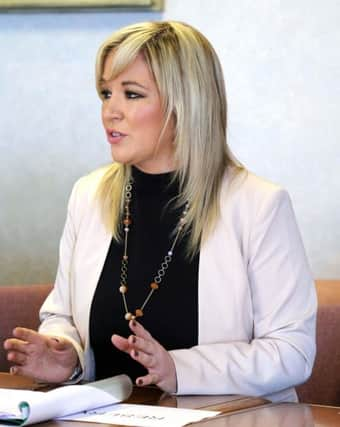Dairy crisis talks held in Belfast


The Minister pointed out that the Agri Food Strategy Board and Supply Chain Forum had been established to deal with industry challenges and to develop workable solutions.
“This model of industry collaboration has already worked very well to deliver a project on livestock genetics improvement. I encouraged all those represented today to come together within that framework to progress this very important work on behalf of the local dairy sector.”
Advertisement
Advertisement
The minister confirmed that she has asked her officials to work with industry representatives to establish a dedicated working group with a specific remit of addressing the issues facing the dairy sector right now.
“It is important that DARD plays its role and my commitment to supporting our farmers is undiminished. I will continue to lobby on their behalf in Brussels, Dublin and London. I will also continue to work with the banks and finance companies to encourage maximum flexibility. My department has made more than 96% of Basic Payments to date and is working hard to complete the remainder.”
O’Neill concluded: “I will work with political representatives across these islands, and with industry representatives to achieve our long-term goals for the sector. I want everyone to engage in a united way to identify potential solutions and develop strategies that will address the issues we face.”
Union president Ian Marshall described the meeting as a useful opportunity for stakeholders in the dairy industry to engage in dialogue and discussions on what are exceptional circumstances.
Advertisement
Advertisement
“There was consensus that this situation looked like it would be prolonged and difficult for all concerned,” he said.
“The value of milk currently equates to 15 -16 pence a litre to a farmer. This is totally unsustainable and there is no realistic prospect of a short term improvement locally or globally.
“There was agreement that there were two key issues to be addressed.
“The first is the current cash flow crisis on farms and the need to access mechanisms that will alleviate these short term financial and other concerns.
Advertisement
Advertisement
“Secondly, there is the need for a wider debate on a longer term strategic approach to managing volatility and the challenges for the dairy industry that flow from this.”
Marshall confirmed that all present were acutely aware of the stark reality that the level of agri bank borrowing had increased significantly across all sectors. The figure now stands at £996m, up £67 million from the previous year.
“There was also acknowledgement that there was a huge diversity in farm circumstances,” he said.
“This reflects investment, level of borrowing, maturity of business and the existence of other revenue streams. This did not however take away from the fact that a large number of businesses are under huge financial stress with no signs of recovery on the horizon.”
Advertisement
Advertisement
According to Ian Marshall, the most significant outcome of Thursday’s meeting was the recognition that the financial climate had become more difficult for agriculture as a whole over recent months.
“There is no single solution to these problems,” he stressed. “The UFU believes it would take all involved to be more radical in our thinking on mechanisms to tackle the current issues and the longer term volatility challenge.”
Farmers for Action co-ordinator William Taylor said the message his group brought to the meeting was that there was “no time left” for dairy farmers.
He said: “FFA and others made it clear that basically every 100 cows milked have lost approximately £75,000 in the last 16 months and are continuing to do so. Many farming families are on their knees financially virtually without money to feed their own families not to mention concentrates for their concentrates for the animals and fertiliser purchases looming.”
FFA is calling for all political parties to support its drive for legislation across the staples to return farmers a minimum of the cost of production plus a margin inflation linked.